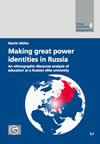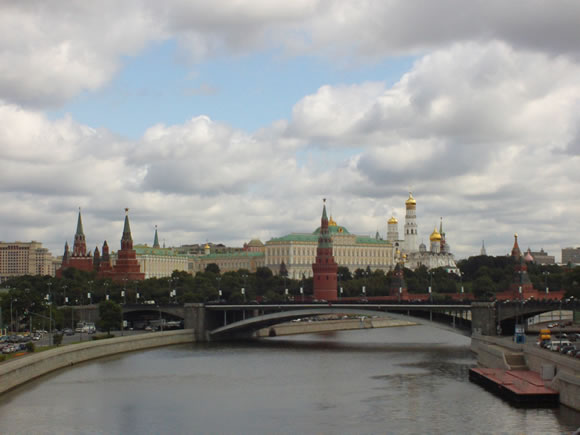Introducing Martin Müller
 Martin Müller is Assistant Professor in the School of Humanities and Social Sciences at the University of St. Gallen in Switzerland.
Martin Müller is Assistant Professor in the School of Humanities and Social Sciences at the University of St. Gallen in Switzerland.
He is a political geographer with an interest in critical geopolitics and Russia.
His PhD examined geopolitical visions of Russia’s role in word politics at a Moscow elite university.
Article
Looking behind the façade of Russian great power thinking
 The war in South Ossetia in August 2008 once again fuelled discussions on Russia’s re-emergence as a great power in world politics – a great power that flexes its military muscle and asserts its influence not only in the post-Soviet space but also beyond. But what is behind Russian great power thinking?
The war in South Ossetia in August 2008 once again fuelled discussions on Russia’s re-emergence as a great power in world politics – a great power that flexes its military muscle and asserts its influence not only in the post-Soviet space but also beyond. But what is behind Russian great power thinking?
In this contribution, Martin Müller argues that visions of a great power Russia have, in fact, inevitable flaws: they are shot through with intense doubts and misgivings about the very possibility of this strength.
Sailing close to the great power winds
In the aftermath of the South Ossetian conflict in August last year strangely familiar rhetoric flared up in the headlines of Western newspapers. The Australian announced that “The bear is back”, the German Zeit saw the West facing “The Russian threat” and Time Magazine, reminiscent of the epic Star Wars saga, exclaimed that “The empire strikes back”! Even broadsheets such as the leading German Süddeutsche Zeitung ran headlines like the following: “Russian foreign policy strategy still knows only one idea: the tank”. Russia seemed to announce its comeback on the stage of international politics with a flourish.
The oil price has plunged and Russia has taken a beating from the sharp recession since August last year, but this predicament seems to have altered little in Russia’s great power rhetoric one year after South Ossetia. The credo that Russia is – or will soon become – a great power continues to rule unabashed under the dual leadership of Medvedev and Putin. The crisis may have slowed down the great power project – but there is no reason to shelve it. This, at least, is the bottom line of the official position in Russia.
Listen closely
But let’s listen closely. Because if we do that, we begin to hear regular qualms about Russia’s status of a great power – not only since the crisis but also before. Simmering beneath the smooth great power surface are doubts, not voiced in the overblown rhetoric of high politics, saying that Russia may not be so strong after all.
But in order to hear those doubts we need to move away from the official rhetoric of political speeches and policy papers. We need to look, for example, at the opinion of students and lecturers at the Moscow State Institute of International Relations. This institute has traditionally educated future foreign ministers, ambassadors and other high-ranking officials in the Russian state and can therefore serve as an indicator of opinion within future Russian elite circles. And there, surprisingly, Russia’s great power project does not seem so impregnable. In fact, there appears a gap between aspiration and reality: Russia wants to become a great power – but is not quite able to realise this.
The colour revolutions challenging Russian great power ambitions
But what keeps Russia from becoming the great power it aspires to be? In discussions at the Moscow State Institute of International Relations Western actions are frequently thought to block Russia’s re-emergence as a great power. The colour revolutions in several post-Soviet states are associated with Western agency, which aims to weaken Russia by snatching away its former brother states. Just as in Soviet times, the West is still working against Russia, as one professor, ridiculing the colour revolutions in florid language, holds:
[L]ook at those botanic revolutions, or at the horticultural revolutions or at the flower revolutions as they call them. Lemon revolution, saffron revolution. All those revolutions cannot do without Western NGOs. The West, in fact, is at work. It is just that in the closed Soviet society we did not know how the West worked against us.
If the West will be successful in seducing the post-Soviet states, the project of a strong Russia, so the story goes, is doomed to fail. By the same token, Tatjana, a student of International Relations at the Moscow State Institute of International Relations, perceives the eastern expansion of the European Union and NATO as an effort to contain Russia:
All ex-republics of the CIS are rushing to follow the West, joining NATO or joining the EU. There is a constant tendency of dissociation from Russia, of diminishing the Russian influence over these states.
Lack of recognition
It is not only the perceived threat of losing the post-Soviet states that is seen to thwart the Russian great power ambitions. Among people at the Moscow State Institute of International Relations there is also the impression that Russia’s great power role does not find adequate recognition among other states. Alexander, a student of International Relations claims:
We can do what we want: we stay unreliable partners. Here, again, it is tried to create such a negative image of Russia.
This lack of recognition is a persistent and recurring pattern in descriptions of Russia’s relations with Western states. Natalija, another student, provides an example:
One other thing that I feel sad about is that Russia very often plays the role of a whipping boy in international relations, because Russia’s prestige, its image in the eyes of other countries is not improving or is only improving very slowly. All of my friends who were in Europe say that Russia is perceived as a monster there. Such negative dispositions! And at all conferences which were especially organised for Russians and Europeans, to jointly study and research certain problems, Russia serves as an example of all the anti-democratic vices you can possibly think of in this world.
Is this the thundering bold confidence of a great power? Hardly. Quite on the contrary, the Russian great power project is perceived to be under siege from many sides.
Russia’s great power project is necessarily always flawed
Some observers might say that the doubts about Russia’s great power role represent the gap between wishful thinking and reality: the official ideology in Russia pretends that the country is stronger than it really is. But this would mean that Russia could become a great power if it was just able to close this gap, to do away with those obstacles blocking its path. In order to do so, Russia must become stronger still.
This argument is based on a fallacy. Why? Because it is only due to the obstacles blocking its emergence that the need for a strong Russia exists. They are the point of reference against which a strong Russia is defined. Russia must be a strong country to stand up against and do away with them: Russia must face the West, demonstrate its power in the post-Soviet states and fight for its recognition. Even if Russia were to overcome all those obstacles, it would not become a great power. Quite on the contrary: the Russian great power project would be doomed to collapse, since there would be nothing left for a strong Russia to stand up against.
This, then, is what classic foreign policy analysis tends to overlook: the perceived obstacles to Russia’s emergence as a great power are not flaws to be done away with – they are essential to being able to think of Russia as a great power in the first place. The Russian great power project is necessarily always flawed, always incomplete. It cannot exist otherwise. This leads to one important conclusion: if we want to better understand the Russian great power project, we need to focus on the perceptions of what prevents the realisation of this project.
To understand social reality, then, is not to understand what society is, but what prevents it from being (Laclau 1990: 44).
Key Readings
- Hopf, T. 2002. Social construction of international politics: identities and foreign policies, Moscow, 1955 and 1999. Ithaca: Cornell University Press.
- Laclau, E. 1990. New reflections on the revolution of our time. London: Verso.
- Müller, M. 2009. Making great power identities in Russia. An ethnographic discourse analysis of education at a Russian elite university. Zürich: LIT.
- Neumann, I. B. 2008. Russia as a great power, 1815-2007. Journal of International Relations and Development 11 (2):128-151.

